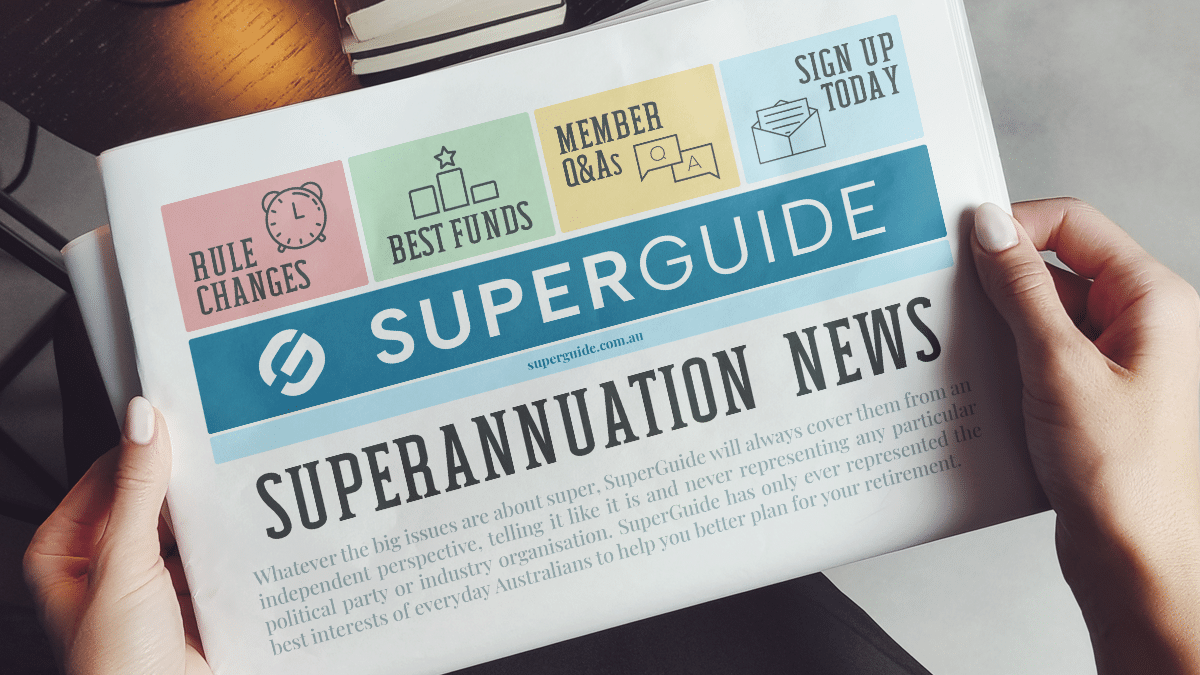In this guide
- Your Future Your Super legislation referred to Committee
- Top 10 lost and unclaimed super postcodes
- Super is not the solution for housing affordability.
- Super exhaustion
- Gender imbalance in superannuation tax concessions
- ASIC admits it was wrong on SMSF costs
- AMP appoints first female CEO
- Get more guides like this with a free account
Your Future Your Super legislation referred to Committee
The Your Future, Your Super legislation, announced in last October’s Federal Budget, has been introduced into Parliament and referred to the Senate Economics Committee. The Committee’s report is due by 22 April 2021 and the measures are intended to apply from 1 July 2021 if passed.
The measures are designed to stop the creation of unintended multiple superannuation accounts by ‘stapling’ accounts to members so their original super account follows them when they move jobs.
The measures are also intended to make it easier for members to choose a well-performing product through a new online comparison tool, and increase accountability and transparency in the sector by having superannuation funds comply with a new duty to act in the best interests of members.
However, some superannuation funds and industry observers are concerned the legislation, although worthy in its intent, is seriously flawed and should be completely reworked.
In a media release, the Australian Institute of Superannuation Trustees (AIST) said the Bill “ignores the fact that neither of the Commissions – (the Productivity Commission (PC) and Royal Commission (RC)) – recommended that the Minister of the day be given the extraordinary power to ban super fund investments or expenditure regardless of whether they are in members’ best financial interests.”
AIST is also concerned that fees are not included in the proposed performance assessment, and that members may be ‘stapled’ to a dud fund.
Top 10 lost and unclaimed super postcodes
There are billions of dollars still sitting in unclaimed superannuation accountants, according to the latest data from the Australian Taxation Office. The ATO reported that $13.8 billion was being held as lost or unclaimed superannuation as at 30 June 2020.
People who live in postcode 2000 in NSW, which encompasses The Rocks, Millers Point, Sydney, Sydney South, Barangaroo, Dawes Point, and Haymarket, have the highest amount of unclaimed super at $63.6 million in a total of 8301 accounts. That is followed by postcode 4870 in Queensland (Aeroglen, Brinsmead, Bungalow, Cairns, Earlville, Edge Hill, Freshwater, Kamerunga, Kanimbla, Mackinnon, Manoora, Manunda, Mooroobool, North Cairns, Parramatta Park, Portsmith, Redlynch, Stratford, Westcourt, and Whitfield), and 2026 in NSW (Bondi, Bondi Beach, North Bondi, and Tamarama).
| Ranking | Postcode | State | Total number of accounts | Total value of accounts |
|---|---|---|---|---|
| 1 | 2000 | NSW | 8,301 | $63,628,141 |
| 2 | 4870 | QLD | 10,963 | $40,293,494 |
| 3 | 2026 | NSW | 6,641 | $38,484,269 |
| 4 | 2138 | NSW | 4,164 | $38,058,252 |
| 5 | 2010 | NSW | 6,194 | $37,607,666 |
| 6 | 2170 | NSW | 11,259 | $37,373,976 |
| 7 | 4740 | QLD | 8,173 | $36,606,452 |
| 8 | 4350 | QLD | 9,675 | $36,558,421 |
| 9 | 3030 | VIC | 7,690 | $33,483,251 |
| 10 | 2560 | NSW | 8,728 | $32,265,752 |
Super is not the solution for housing affordability.
Research by the Association of Superannuation Funds of Australia (ASFA) has shown that allowing people to use their superannuation for housing – as advocated by some Coalition MPs – would put upward pressure on house prices and chiefly benefit those who could already afford to buy a house.
“Australia already has some of the most expensive housing in the world. With the prevailing macro-economic conditions and surging demand for housing, using super for housing deposits would be disastrous and push prices even further out of reach of first-time buyers,” ASFA chief executive officer, Dr Martin Fahy, said.
“Superannuation isn’t the reason young Australians can’t afford to buy a home of their own. A lack of supply, and the policy settings with respect to residential investment property has had a distortionary effect on demand. These are the real issues that must be tackled to generate improvements in housing affordability.”
In its paper, ASFA instead recommends that the Federal Government commission an independent review of housing affordability to establish a “fact base” in relation to the causes of unaffordability and its detrimental impacts. More controversially, ASFA also calls for age pension means testing to include significant levels of owner-occupied housing wealth.
Super exhaustion
In other research, ASFA also found that the majority (90 per cent of retirees aged over 80) of Australians completely exhaust their superannuation savings before they die.
This is in contrast to a key finding of the Retirement Income Review that the majority of Australians die with most of their superannuation wealth at retirement intact.
ASFA said the findings dismiss the idea that retirees are underspending or bequeathing their super.
“The majority of Australian retirees run out of super well before the end of their lives,” ASFA chief executive officer, Martin Fahy, said.
The research used Australian Taxation Office (ATO) data, Australian Prudential Regulation Authority (APRA) data, and Household, Income and Labour Dynamics in Australia (HILDA) survey results.
It found even younger cohorts used up all their super before they died. Of people aged 60 and over who died in the period 2014 to 2018, 80% had no super at all in the period of up to four years before their death.
“The main challenge for the Australian superannuation system is to deliver higher superannuation balances at retirement. The solution for ensuring adequacy of retirement incomes is moving the Superannuation Guarantee to 12 per cent,” Fahy said.
Gender imbalance in superannuation tax concessions
Superannuation tax concessions cost the Federal Budget $41.2 billion a year but most of the benefit (72%) flows to men, according to economic modelling commissioned by the Australia Institute from the Centre for Social Research and Methods.
Women receive just 28 % of superannuation tax concessions. In other words, for every dollar that women get in super tax concessions, men get $2.52.
“The way the economy is designed is stacked against women every step of the way. Gender pay gap, childcare, superannuation, and our research shows even Australia’s system of tax concessions are stacked against women,” research economist at the Australia Institute, Eliza Littleton, said.
Superannuation tax concessions are larger for higher income earners who are often men, but the Australia Institute paper suggests that if tax concessions are supposed to help all people fund their retirement, giving more to men is counterintuitive.
“A well-thought-through retirement incomes policy would give larger concession to those who were less likely to be able to fund their own retirement,” the report says.
ASIC admits it was wrong on SMSF costs
In his opening statement to the House of Representatives Standing Committee on Economics, Australian Securities and Investment Commission (ASIC) chair James Shipton has admitted that earlier estimates on how much it cost to run an SMSF a year were inadequate.
“We acknowledge that disclosing only the average cost of running a SMSF in the fact sheet that was distributed as part of the pilot was not sufficient, even though, at that stage, this was the only cost figure available to us. We regret failing to seek a median cost figure before distributing the fact sheet,” he said.
In that now retired fact sheet – called Self-managed super funds: Are they right for you? – ASIC stated that the average cost of running an SMSF was $13,900 a year. In contrast, research conducted by Rice Warner in late 2020, for the SMSF Association, found that annual costs for a fund with a balance of $300,000 in the 50th percentile ranged from $2,939 for a fund with just pension accounts up to $3,194 for a fund with both pension and accumulation accounts.
AMP appoints first female CEO
Embattled financial services company AMP Limited has announced a new chief executive officer – and its first female appointment to the role – after confirming that current CEO Francesco De Ferrari will depart the company in the third quarter of this year.
Alexis George, current deputy chief executive officer at ANZ, will be AMP’s new CEO.
“In Alexis George, we have a great leader and strong fit for the future of our company. On any measure, she has outstanding industry experience in wealth management and banking, and is committed to continue the transformation of AMP’s business, and importantly, our organisation’s culture,” AMP chair Debra Hazelton said in a statement.
Get more guides like this with a free account
better super and retirement decisions.



Leave a Reply
You must be logged in to post a comment.